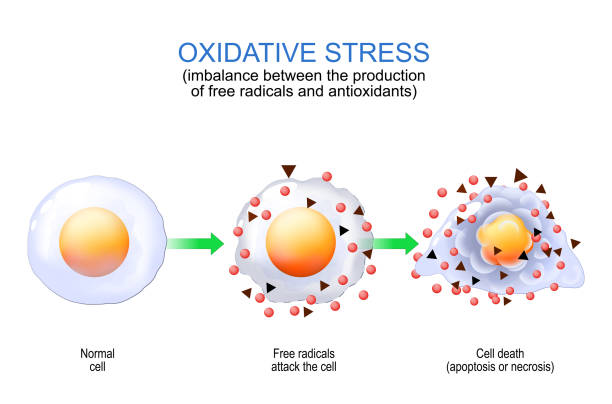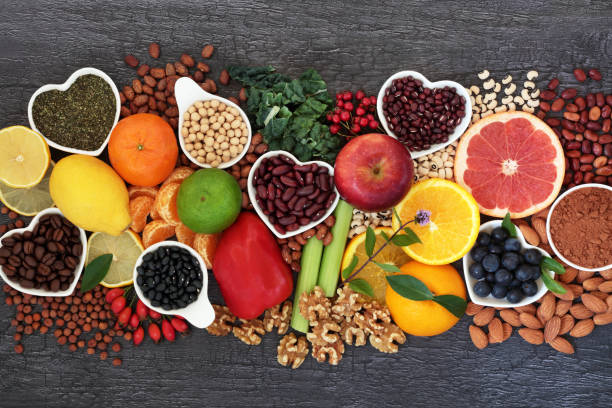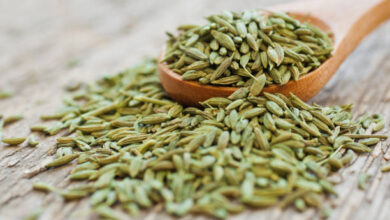
Antioxidants
Antioxidants, present in numerous plant-based foods, are molecules that assist the body in combating detrimental free radicals, associated with health conditions such as diabetes and cancer. Notable examples of antioxidants include Vitamin E and Vitamin C.

Understanding Antioxidants
Antioxidants serve as powerful molecules that combat free radicals within the body.
When levels of free radicals become excessive, they can pose harm to the body and are associated with various illnesses, including diabetes, heart disease, and cancer.
Naturally, the body possesses its antioxidant defense mechanisms to regulate free radicals.
Moreover, antioxidants can be sourced from foods, particularly fruits, vegetables, and other plant-based whole foods. Notably, vitamins E and C are recognized for their efficacy as antioxidants.
Additionally, antioxidant preservatives are instrumental in prolonging the shelf life of food products.
The Functions of Free Radicals

The human body continuously produces free radicals. In the absence of antioxidants, free radicals would lead to significant harm rapidly, ultimately leading to death. Nevertheless, free radicals also play crucial roles that are vital for maintaining good health. For instance, immune cells utilize free radicals to combat infections.
To maintain overall health, the body must uphold a specific equilibrium between free radicals and antioxidants. An excess of free radicals relative to antioxidants can result in oxidative stress, which has the potential to harm DNA and crucial molecules and may even lead to cell death. DNA damage heightens the risk of cancer, and some researchers have postulated its significant influence on the aging process.
Numerous lifestyle, stress, and environmental factors have been identified as contributors to increased free radical production and oxidative stress, such as:
-
environmental pollution
-
tobacco smoke
-
alcohol consumption
-
toxins
-
elevated blood glucose levels.
-
exposure to radiation, including prolonged sun exposure
-
infection by bacteria, fungi, or viruses
-
excessive consumption of iron, magnesium, copper, or zinc
-
imbalance of oxygen levels in the body
-
rigorous and prolonged physical activity leading to tissue damage
-
deficiency in antioxidants.
List of Natural Sources of Antioxidants

Numerous plant-based foods are abundant sources of antioxidants. Some of the key sources to consider include:
-
Artichokes
-
Beans
-
Berries
-
Cherries
-
Cocoa
-
Coffee and tea
-
Dark leafy greens
-
Herbs and spices
-
Nuts and seeds
-
Pomegranate
-
Potatoes and sweet potatoes
-
Tomatoes
-
Whole grains.
Enhancing Your Antioxidant Intake
To enhance your consumption of antioxidants, along with vitamins, minerals, and fiber, strive to incorporate a diverse range of colorful plant-based food groups into your diet. Replacing processed foods with whole, plant-based options can also help boost your antioxidant intake.
Furthermore, you may want to consider the following suggestions and tips for increasing your consumption of antioxidants:
-
Exchange a breakfast pastry for a serving of ‘zoats’ (zucchini oatmeal) topped with fruit and nuts.
-
Opt for a bowl featuring a generous bed of greens topped with beans, brown rice, and savory guacamole.
-
Enjoy a snack of fruit with nuts or seeds, or vegetables with hummus.
-
Indulge your sweet tooth with dark chocolate.
-
Enhance your morning coffee by adding a dash of cinnamon, and infuse water or tea with herbs and pieces of antioxidant-rich fruit.
Various Types of Dietary Antioxidants
Antioxidants can be classified as either soluble in water or fat.
Water-soluble antioxidants carry out their functions in the fluid inside and outside cells, while fat-soluble antioxidants primarily act in cell membranes.
Significant dietary antioxidants comprise:
-
Vitamin C. This essential dietary nutrient serves as a water-soluble antioxidant.
-
Vitamin E. Playing a critical role in safeguarding cell membranes against oxidative damage, this antioxidant is fat-soluble.
-
Flavonoids. A group of plant antioxidants that yield numerous beneficial health effects.
Notable examples of these substances can be found in turmeric, with its curcuminoids, and extra virgin olive oil, which contains oleocanthal. Both of these substances not only function as antioxidants but also possess substantial anti-inflammatory properties.
Antioxidant Supplements

Antioxidant supplements are formulated with antioxidants such as selenium, vitamin C, and beta-carotene, which are commonly found in food. These supplements aim to counteract free radicals, similar to natural antioxidants.
For further information, refer to the National Cancer Institute’s resource on Antioxidants and cancer prevention.
It is worth noting that scientific consensus suggests that obtaining antioxidants from food sources is preferable to relying on supplements. This is due to the tendency of antioxidant supplements to be provided in high doses, which can potentially have adverse effects. Additionally, research on the efficacy of antioxidant supplements has yielded inconclusive results, with some studies showing little to no significant health benefits.
Understanding the Risk Factors
Research indicates that the use of high-dose beta-carotene supplements has been associated with a higher risk of lung cancer in smokers. Similarly, taking high-dose vitamin E supplements has been linked to increased risks of hemorrhagic stroke—a type of stroke caused by bleeding in the brain—and prostate cancer.
Additionally, it is important to be aware of potential drug interactions between antioxidant supplements and prescribed medications. For instance, individuals taking blood thinners may face an elevated risk of bleeding when also using vitamin E supplements.
The Impact of Antioxidants in Coffee
Views on coffee vary widely — some tout its health benefits and invigorating effects, while others decry its potential for addiction and harm.
However, a comprehensive review of the available evidence suggests that most research indicates positive effects of coffee on health.
For instance, studies have associated coffee consumption with a lowered risk of type 2 diabetes, liver ailments, and Alzheimer’s disease.
Many of the documented health benefits of coffee are thought to stem from its substantial concentration of potent antioxidants.
Indeed, research reveals that coffee ranks among the principal sources of antioxidants in the human diet.
This article presents comprehensive information on the remarkable antioxidant content of coffee.

Associated with Mitigated Risk of Various Diseases
Consuming coffee is linked to a decreased likelihood of developing various diseases, as indicated by research studies. For instance, individuals who consume coffee have a 23–50% lower risk of type 2 diabetes, with each daily cup associated with a 7% reduced risk. Additionally, coffee consumption appears to have a positive impact on liver health, as coffee drinkers demonstrate a notably diminished risk of liver cirrhosis. Furthermore, it is suggested that coffee consumption may reduce the risk of liver and colorectal cancer, and multiple studies have documented a decreased risk of heart disease and stroke.
Regular consumption of coffee has been associated with a potential 32–65% reduction in the risk of developing Alzheimer’s and Parkinson’s diseases. Additionally, research suggests that coffee consumption may have positive effects on mental health, with women who drink coffee being less susceptible to depression and suicide.
Furthermore, drinking coffee has been correlated with a longer lifespan and a potential 20–30% decrease in the risk of premature death. It’s important to note that while many studies have made these observations, they are primarily based on correlation and do not definitively establish causation between coffee consumption and reduced disease risk.
Summary
Antioxidants play a crucial role in proactive nutrition, potentially aiding in the prevention of aging and chronic diseases. However, it’s important to note that they are not panacea and should not be used in supplement form to address medical conditions without the oversight of a healthcare professional.
For optimal antioxidant benefits, it’s advisable to obtain them from whole foods or products crafted from whole food ingredients. This approach not only provides the most enjoyable and satisfying experience but also maximizes the potential health benefits.





